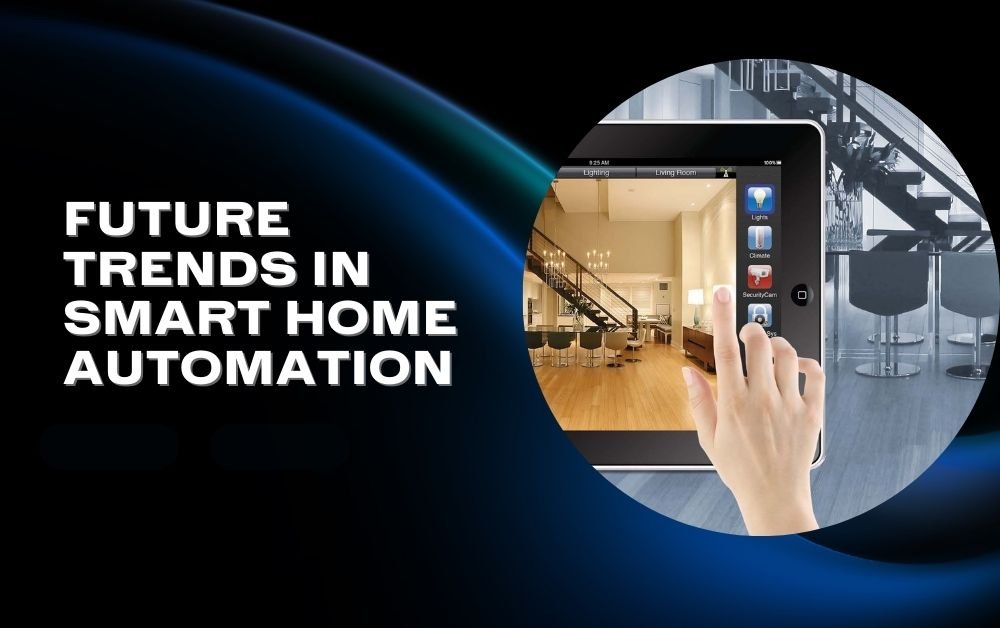As technology evolves, so does the world of smart home automation. Smart home systems have already transformed the way we live by making our homes more convenient, secure, and efficient. But what does the future hold for these systems? In this blog post, we’ll explore some of the most exciting trends that are shaping the future of smart home automation. From advanced artificial intelligence to increased integration with other technologies, the next few years promise to bring some amazing innovations.
The Rise of Artificial Intelligence in Smart Homes
How AI Is Changing Smart Home Automation
Artificial Intelligence (AI) is set to become a cornerstone of smart home automation. AI enables devices to learn from user behavior and adapt to preferences over time. This means that your smart home system could become even more intuitive and responsive. For instance, an AI-powered thermostat might learn your daily routines and automatically adjust the temperature to suit your preferences without you having to lift a finger. This kind of automation helps in not just enhancing comfort but also in optimizing energy usage.
Personalized Home Experiences with AI
AI is also making it possible for smart homes to offer highly personalized experiences. Imagine a home where the lighting adjusts based on your mood, or the music system plays your favorite tunes as soon as you walk in. These advancements are not far off. AI can analyze patterns and make predictions to enhance your living space. This level of personalization will make homes more enjoyable and suited to individual tastes, turning smart homes into true extensions of our personal lives.
Note – Ready to elevate your living experience with the latest advancements in Smart Home Automation Systems in Dubai? Discover how GrandKolours can transform your home into a cutting-edge smart space right here in Dubai. Contact us today to explore our range of innovative smart home solutions tailored to your needs. Don’t miss out on the future of home living—get in touch with GrandKolours now and take the first step towards a smarter, more efficient home!
Integration with Smart City Technologies
Connecting Homes with Smart Cities
The future of smart home automation also involves integration with smart city technologies. As cities become smarter, homes will need to adapt to these changes. This means that your home might one day be able to interact with city infrastructure in real-time. For example, your smart home could receive alerts about traffic conditions or weather updates directly from city sensors, allowing you to adjust your plans accordingly. This connectivity can lead to more efficient living and better utilization of resources.
Enhancing Urban Living with Smart Solutions

Smart city technologies will also enhance urban living by improving safety and convenience. For instance, smart street lighting and waste management systems can make neighborhoods safer and cleaner. Homes equipped with smart technology will be able to benefit from these improvements, creating a seamless connection between private and public smart solutions. This integration will make it easier to manage various aspects of daily life, from avoiding traffic jams to ensuring timely waste collection.
Increased Focus on Cybersecurity
Why Cybersecurity Matters for Smart Homes
As smart home systems become more advanced, the importance of cybersecurity cannot be overstated. With more devices connected to the internet, there is an increased risk of cyber threats. Future smart home systems will need to prioritize security to protect users’ personal information and ensure that their devices are not vulnerable to hacking. Manufacturers will need to implement stronger encryption methods and security protocols to safeguard smart home networks.
Innovations in Smart Home Security
To address these concerns, there will be significant innovations in smart home security. This includes more sophisticated authentication methods, such as biometric sensors that can recognize your fingerprint or face. Additionally, real-time monitoring and alert systems will become more prevalent, providing immediate notifications if any unusual activity is detected. By focusing on these security measures, future smart home systems will be better equipped to handle the challenges of an increasingly connected world.
Sustainability and Energy Efficiency
Green Technology in Smart Homes
Sustainability is becoming a major focus in smart home automation. Future systems will incorporate green technologies to help reduce energy consumption and minimize environmental impact. For example, smart homes will use advanced sensors to monitor energy usage and adjust settings to improve efficiency. Solar panels and other renewable energy sources will be integrated into smart home systems, making it easier for homeowners to use clean energy.
Benefits of Energy-Efficient Smart Home Systems
The shift toward energy-efficient smart home systems will not only benefit the environment but also lead to cost savings for homeowners. By optimizing energy use, smart homes can reduce utility bills and decrease overall energy consumption. This makes smart home automation a win-win for both the planet and your wallet. As technology continues to advance, we can expect even more innovative solutions to help create sustainable and energy-efficient living spaces.
Enhanced Voice and Gesture Controls
The Evolution of Voice Assistants
Voice assistants have already become a staple in many smart homes, but future trends suggest they will become even more advanced. Voice recognition technology will improve, making it easier for users to control their smart home systems with natural language commands. This means you’ll be able to have more complex interactions with your devices and perform tasks more efficiently.
Gesture-Based Controls for Smart Homes
In addition to voice controls, gesture-based controls are expected to gain popularity. Imagine controlling your home’s lighting, entertainment systems, or even appliances with simple hand gestures. This technology will offer a more intuitive way to interact with smart home systems and will be especially useful in situations where voice commands are not practical.
Seamless Integration with Wearable Technology
The Growing Role of Wearables
Wearable technology, such as smartwatches and fitness trackers, is becoming increasingly sophisticated. Future smart home systems will integrate seamlessly with these devices, allowing for greater control and automation based on your health and activity data. For example, if your wearable detects that you are about to fall asleep, it could automatically adjust the lighting and temperature to create a more comfortable sleep environment.
Personalized Experiences Through Wearables
Wearables will also provide personalized experiences by syncing with your smart home system. This means that your home could adapt to your needs in real-time, based on the data collected from your wearable devices. Whether it’s adjusting the thermostat based on your body temperature or turning on a humidifier based on your health metrics, the integration of wearables with smart home technology will enhance comfort and convenience.
The Role of 5G Technology
How 5G Will Impact Smart Home Automation
5G technology promises to revolutionize smart home automation by providing faster and more reliable internet connections. This increased bandwidth will enable more devices to connect and communicate simultaneously without experiencing delays or interruptions. As a result, smart home systems will become more responsive and capable of handling more complex tasks.
Enhanced Connectivity and Device Management
With the advent of 5G, smart home devices will be able to communicate more efficiently and manage multiple tasks simultaneously. This will lead to a more seamless user experience, with fewer connectivity issues and faster response times. Additionally, 5G will support the growth of the Internet of Things (IoT), allowing for even greater integration and automation within smart homes.
Conclusion
The future of smart home automation is brimming with possibilities. From the integration of artificial intelligence and smart city technologies to advancements in cybersecurity and energy efficiency, these trends are set to make our homes more intelligent, secure, and sustainable. As technology continues to evolve, smart home systems will become increasingly sophisticated, offering new ways to enhance our daily lives. Staying informed about these trends will help you make the most of the innovations on the horizon and ensure that your smart home remains at the cutting edge of technology.
For more insightful articles related to this topic, feel free to visit businesshonchos.in



